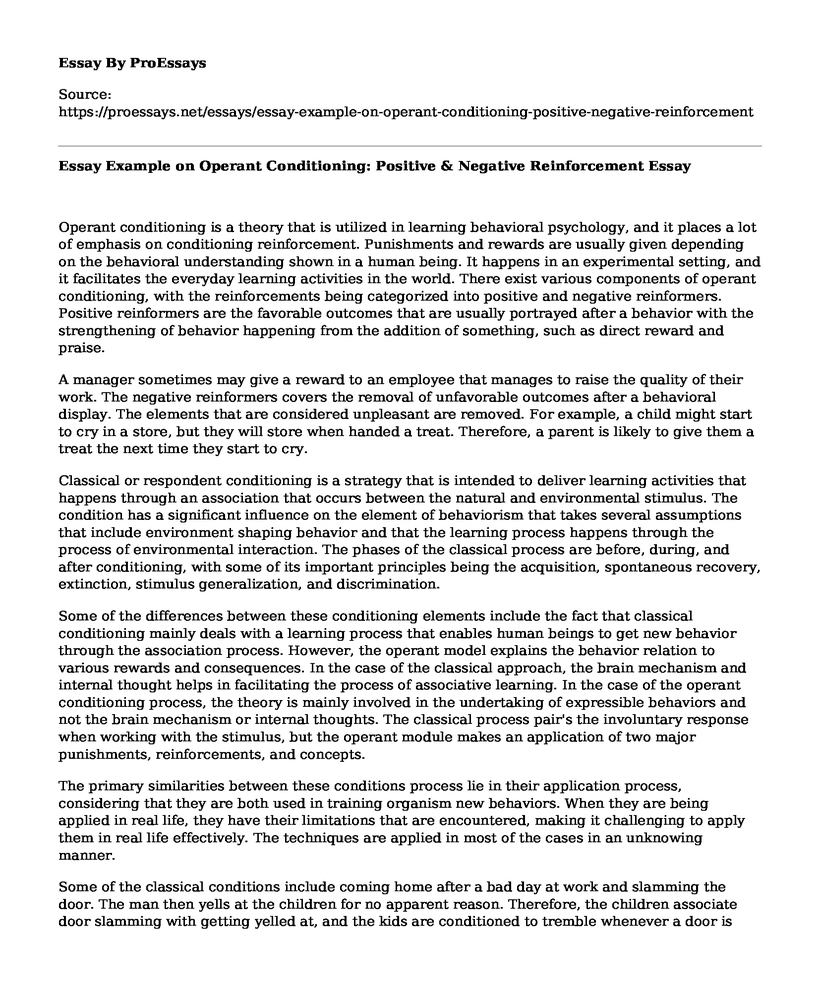Operant conditioning is a theory that is utilized in learning behavioral psychology, and it places a lot of emphasis on conditioning reinforcement. Punishments and rewards are usually given depending on the behavioral understanding shown in a human being. It happens in an experimental setting, and it facilitates the everyday learning activities in the world. There exist various components of operant conditioning, with the reinforcements being categorized into positive and negative reinformers. Positive reinformers are the favorable outcomes that are usually portrayed after a behavior with the strengthening of behavior happening from the addition of something, such as direct reward and praise.
A manager sometimes may give a reward to an employee that manages to raise the quality of their work. The negative reinformers covers the removal of unfavorable outcomes after a behavioral display. The elements that are considered unpleasant are removed. For example, a child might start to cry in a store, but they will store when handed a treat. Therefore, a parent is likely to give them a treat the next time they start to cry.
Classical or respondent conditioning is a strategy that is intended to deliver learning activities that happens through an association that occurs between the natural and environmental stimulus. The condition has a significant influence on the element of behaviorism that takes several assumptions that include environment shaping behavior and that the learning process happens through the process of environmental interaction. The phases of the classical process are before, during, and after conditioning, with some of its important principles being the acquisition, spontaneous recovery, extinction, stimulus generalization, and discrimination.
Some of the differences between these conditioning elements include the fact that classical conditioning mainly deals with a learning process that enables human beings to get new behavior through the association process. However, the operant model explains the behavior relation to various rewards and consequences. In the case of the classical approach, the brain mechanism and internal thought helps in facilitating the process of associative learning. In the case of the operant conditioning process, the theory is mainly involved in the undertaking of expressible behaviors and not the brain mechanism or internal thoughts. The classical process pair's the involuntary response when working with the stimulus, but the operant module makes an application of two major punishments, reinforcements, and concepts.
The primary similarities between these conditions process lie in their application process, considering that they are both used in training organism new behaviors. When they are being applied in real life, they have their limitations that are encountered, making it challenging to apply them in real life effectively. The techniques are applied in most of the cases in an unknowing manner.
Some of the classical conditions include coming home after a bad day at work and slamming the door. The man then yells at the children for no apparent reason. Therefore, the children associate door slamming with getting yelled at, and the kids are conditioned to tremble whenever a door is slammed. In another example, when a mother comes home with a bag full of children's toys. Therefore, when children see their mother come home with a big bag, they are thrilled for they associate with toys.
Conclusion
Some of the operant conditioning examples include a child going to bed early and the parent reading a bedtime story. The story time is a positive reinforcement that is intended to realize target behavior. The training of animals on tricks happens through following the operant conditioning process. Whenever a dog performs a particular trick in the right way, a trainer manages to give it a treat, and the animal tends to learn how to do the tricks so that it can get a treat.
References
Commons, M. L., & Giri, S. (2016). Account of operant conditioning based on coordinating three procedural steps of respondent conditioning processes. Behavioral Development Bulletin, 21(1), 14. Praveen S. (2017). "Classical vs Operant Conditioning," in Psychestudy, https://www.psychestudy.com/behavioral/learning-memory/classical-conditioning/classical-vs-operant.
Cite this page
Essay Example on Operant Conditioning: Positive & Negative Reinforcement. (2023, Jul 02). Retrieved from https://proessays.net/essays/essay-example-on-operant-conditioning-positive-negative-reinforcement
If you are the original author of this essay and no longer wish to have it published on the ProEssays website, please click below to request its removal:
- Background of Speech Delay in Toddlers - Research Paper Sample
- Essay on Freud's Theory: Human Development
- Intercultural Communication Affecting Higher Education Development in Malaysia Paper Example
- Essay on Nurse Qualification Impact: Burnout & Career Change?
- Essay on Tech-Innovated Education: Dubai Private Schools Lead the Way
- Essay Example on Stonier: Setting the Pace in Executive Education since 1935
- Paper Example on Age-Related Changes: Nutritional Challenges & Health Risks







